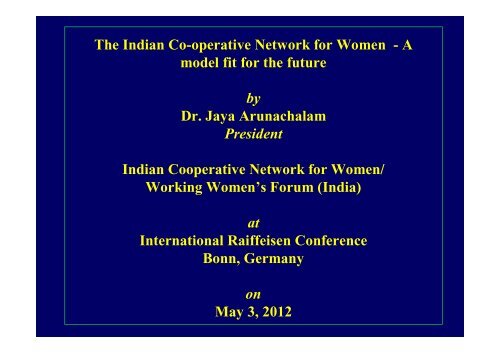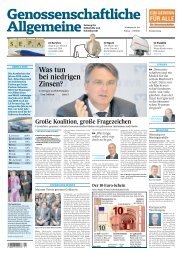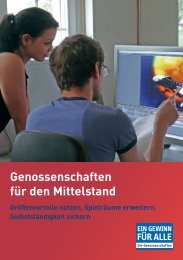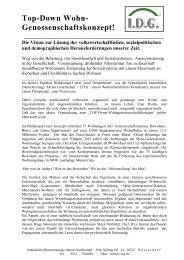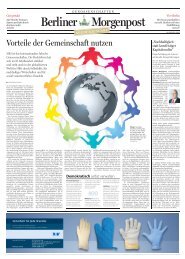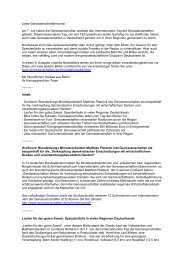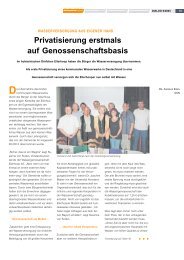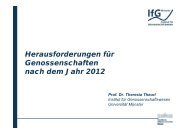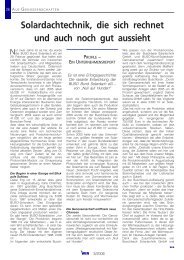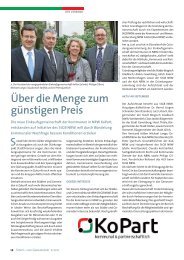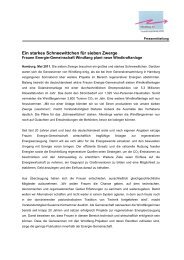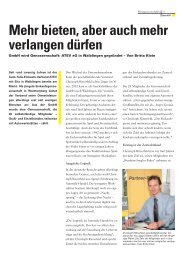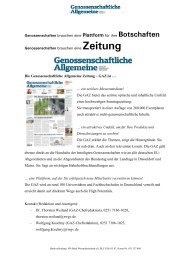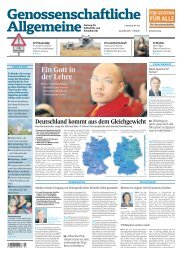The Indian Co-operative Network for Women - A model fit for the ...
The Indian Co-operative Network for Women - A model fit for the ...
The Indian Co-operative Network for Women - A model fit for the ...
You also want an ePaper? Increase the reach of your titles
YUMPU automatically turns print PDFs into web optimized ePapers that Google loves.
<strong>The</strong> <strong>Indian</strong> <strong>Co</strong>-<strong>operative</strong> <strong>Network</strong> <strong>for</strong> <strong>Women</strong> - A<br />
<strong>model</strong> <strong>fit</strong> <strong>for</strong> <strong>the</strong> future<br />
by<br />
Dr. Jaya Arunachalam<br />
President<br />
<strong>Indian</strong> <strong>Co</strong><strong>operative</strong> <strong>Network</strong> <strong>for</strong> <strong>Women</strong>/<br />
Working <strong>Women</strong>’s Forum (India)<br />
at<br />
International Raiffeisen <strong>Co</strong>nference<br />
Bonn, Germany<br />
on<br />
May 3, 2012
Background<br />
Being <strong>the</strong> UN Year of <strong>Co</strong><strong>operative</strong>s it is<br />
imperative to emphasize <strong>the</strong> role of<br />
co<strong>operative</strong>s in some of our countries and<br />
<strong>the</strong>ir impact on vulnerable business groups<br />
of men/women. Experiments like that of<br />
ours i.e., <strong>the</strong> <strong>Indian</strong> <strong>Co</strong><strong>operative</strong> <strong>Network</strong><br />
<strong>for</strong> <strong>Women</strong> (ICNW) is a classic example to<br />
highlight <strong>the</strong> role of co<strong>operative</strong>s that has<br />
facilitated millions of women in <strong>the</strong>ir<br />
entrepreneurship through <strong>the</strong> micro<br />
loaning process.<br />
1
<strong>The</strong> <strong>Indian</strong> <strong>Co</strong><strong>operative</strong> <strong>Network</strong> <strong>for</strong> <strong>Women</strong><br />
<strong>The</strong> microfinance operations of <strong>the</strong> ICNW has facilitated low income<br />
entrepreneurs to meet <strong>the</strong>ir working capital as many of <strong>the</strong>m do not<br />
have access to credit from nationalized banks (though <strong>the</strong> main<br />
objective of nationalization in 1969 being to help <strong>the</strong> poor borrowers<br />
i.e., 1% of <strong>the</strong>ir pro<strong>fit</strong>s). However, it took a different shape by not<br />
bene<strong>fit</strong>ing <strong>the</strong> poor and <strong>the</strong> vulnerable. <strong>The</strong> concept of microfinance<br />
on <strong>the</strong> o<strong>the</strong>r hand grew in a big way to serve <strong>the</strong> low income groups.<br />
<strong>The</strong> experience of <strong>the</strong> ICNW demonstrates that its programmes are<br />
tailor made to suit <strong>the</strong> needs of <strong>the</strong> poor women not only to facilitate<br />
improve <strong>the</strong>ir living/working conditions but also help <strong>the</strong>m to escape<br />
from persistent poverty.<br />
2
<strong>The</strong> Raiffeisen Union<br />
Attending <strong>the</strong> International <strong>Co</strong>nference organized by International<br />
Raiffeisen Union (IRU) we understand that particularly in Germany<br />
<strong>the</strong> long experience of co<strong>operative</strong>s emerged as <strong>the</strong> panacea <strong>for</strong> not<br />
only reducing <strong>the</strong> hardship among poor workers but also to facilitate<br />
carrying out varied business. Similarly <strong>the</strong> European visionary Mr.<br />
Friedrich Wilhelm Raiffeisen facilitated Aworkers to <strong>for</strong>m co<strong>operative</strong>s<br />
in rural areas in <strong>the</strong> middle of 19th century particularly to facilitate<br />
farmers and o<strong>the</strong>r small craft enterprises relieving <strong>the</strong>m out of <strong>the</strong>ir<br />
financial struggle (as <strong>the</strong>y could not meet <strong>the</strong> expenses of <strong>the</strong> working<br />
capital <strong>for</strong> <strong>the</strong>ir business and compensate <strong>the</strong>ir share to <strong>the</strong> landlords).<br />
<strong>The</strong> great visionary took <strong>the</strong> initiative during this period and founded<br />
<strong>the</strong> first collective mechanism to support <strong>the</strong> suffering rural population<br />
of Germany and founded <strong>the</strong> credit union which today has become <strong>the</strong><br />
first conceptual initiative of <strong>the</strong> co<strong>operative</strong>s in <strong>the</strong> spirit of Raiffeisen.<br />
3
<strong>The</strong> Raiffeisen Union<br />
Similar to <strong>the</strong> Raiffeisen’s co<strong>operative</strong>,<br />
<strong>the</strong> <strong>Indian</strong> <strong>Co</strong><strong>operative</strong> Movement too<br />
was organized against <strong>the</strong> deterioration<br />
of rural situation where moneylenders<br />
exploited farmers; and <strong>the</strong> landlords had<br />
given land rights of large acres of land<br />
known as <strong>the</strong> permanent settlement in<br />
favour of <strong>the</strong> colonizers.<br />
<strong>The</strong> freedom fighters of India <strong>the</strong>re<strong>for</strong>e had to fight against such<br />
mechanisms to save <strong>the</strong> exploited masses that India suffered <strong>the</strong>n.<br />
<strong>The</strong>re<strong>for</strong>e it is significant to discuss <strong>the</strong> experiment of <strong>the</strong> unique<br />
women’s co<strong>operative</strong> known as <strong>Indian</strong> <strong>Co</strong><strong>operative</strong> <strong>Network</strong> <strong>for</strong> <strong>Women</strong><br />
(ICNW) promoted by <strong>the</strong> Working <strong>Women</strong>’s <strong>for</strong>um (India) (WWF), its<br />
progress and emerging challenges in <strong>the</strong> competitive business<br />
environment.<br />
4
Working <strong>Women</strong>’s Forum (India) (WWF) a social organization has its<br />
major objective as poverty reduction through microcredit/allied<br />
products. It motivates <strong>the</strong> poor/helpless towards collective vision/action<br />
<strong>for</strong> <strong>the</strong>ir own progress through <strong>the</strong> co<strong>operative</strong> ideology. Within 3 years<br />
of its initiation in 1978, it established a co<strong>operative</strong> <strong>for</strong> women known as<br />
<strong>the</strong> Working <strong>Women</strong>’s <strong>Co</strong><strong>operative</strong> Society in <strong>the</strong> year 1981 with<br />
headquarters in Tamil Nadu.<br />
This was <strong>the</strong> first co-<strong>operative</strong> credit society <strong>for</strong> poor women by poor<br />
women and initiated its operation with 2500 members in <strong>the</strong> year 1981.<br />
Later when <strong>the</strong> women entrepreneurs took <strong>the</strong> lead and expressed <strong>the</strong>ir<br />
desire to spread <strong>the</strong> message to o<strong>the</strong>r states transcending barriers of<br />
linguistic cultural context, it spread its operation to <strong>the</strong> 3 Sou<strong>the</strong>rn States<br />
of India with 14 branches to meet <strong>the</strong> needs of poor women <strong>the</strong>reby<br />
registering <strong>the</strong> Working <strong>Women</strong>’s <strong>Co</strong><strong>operative</strong> Society as multi-state<br />
co<strong>operative</strong>.<br />
5
It is known today as <strong>the</strong> <strong>Indian</strong> <strong>Co</strong>-<strong>operative</strong> <strong>Network</strong> <strong>for</strong> <strong>Women</strong><br />
(ICNW) addressing <strong>the</strong> critical and financial needs of poor women<br />
entrepreneurs.<br />
ICNW reaches <strong>the</strong>se poor women who<br />
live/work in remote areas excluded<br />
from financial services and or even<br />
basic services and helps <strong>the</strong>m to move<br />
out of poverty. <strong>The</strong> credit programme<br />
of <strong>the</strong> ICNW has reached so far<br />
544872 poor entrepreneurs effecting<br />
nearly Rs.2343 million accomplishing<br />
about 99.13% recovery rate in <strong>the</strong><br />
urban slums/rural areas.<br />
6
<strong>The</strong> members of <strong>the</strong> ICNW are involved in trades as vendors, homebased<br />
workers, weavers, garment makers, food processors, handloom/craft<br />
workers, service providers, etc. ICNW was established to streng<strong>the</strong>n not<br />
only <strong>the</strong>ir economic roles but also to orient <strong>the</strong> poor in streng<strong>the</strong>ning<br />
<strong>the</strong>ir existing skills. If necessary train <strong>the</strong>m in new skills enabling most<br />
women in <strong>the</strong> neighbourhoods to join this ef<strong>for</strong>t. <strong>Women</strong> came out of<br />
isolation/seclusion through <strong>the</strong> ef<strong>for</strong>ts of ICNW and have come a long<br />
way to emerge as successful community leaders/ entrepreneurs. 7
<strong>The</strong> clientele are acquainted through orientation in financial literacy,<br />
custody of income, entrepreneurial ventures, alternate skill training, and<br />
general empowerment to equip <strong>the</strong>mselves to face future struggles. <strong>The</strong><br />
concept of participatory training process has made <strong>the</strong>m rich human<br />
resource not only to trans<strong>for</strong>m <strong>the</strong>mselves but also grow as a fully developed<br />
entrepreneur.<br />
This was <strong>the</strong> first experiment of poor women in <strong>the</strong> <strong>Indian</strong> co-<strong>operative</strong><br />
ef<strong>for</strong>t to test <strong>the</strong>ir strength and weakness to have better livelihood options<br />
utilizing <strong>the</strong>ir own banking options.<br />
National <strong>Co</strong><strong>operative</strong> Union of India lauds ICNW: Time-to-time ICNW<br />
organizes skill training/leadership development training programmes with a<br />
motive to impart necessary knowledge/skill and competencies to <strong>the</strong> staff of<br />
14 branches in Tamil Nadu, Andhra Pradesh and Karnataka enabling <strong>the</strong>m<br />
to utilize its nuances in <strong>the</strong>ir day-to-day work. In this perspective, <strong>the</strong> skill<br />
training programme was organized by ICNW on 30 December 2011 where<br />
<strong>the</strong> National co<strong>operative</strong> union of India (NCUI) CEO along with <strong>the</strong><br />
President was invited as <strong>the</strong> chief guests. <strong>Co</strong>mplimenting <strong>the</strong> ef<strong>for</strong>t taken by<br />
ICNW to tap <strong>the</strong> latent talent of <strong>the</strong> women members, <strong>the</strong>y appreciated that<br />
this co<strong>operative</strong> enables women from lower socio-economic groups to raise 8<br />
<strong>the</strong>mselves into confidence, empowerment and blossom into entrepreneurs.
<strong>The</strong> height of <strong>the</strong>ir economic role not<br />
only raised <strong>the</strong>ir standard of living also<br />
demonstrated <strong>the</strong> promise of gender<br />
equality. Fur<strong>the</strong>r appreciation from <strong>the</strong><br />
union was that <strong>the</strong> ICNW/WWF<br />
provided women with <strong>the</strong> skill and<br />
ability to earn a livelihood and earn<br />
between Rs.2000 and Rs.5000 a month<br />
by training <strong>the</strong>m in various trades.<br />
Often, workshops are arranged to equip <strong>the</strong> women with <strong>the</strong> latest<br />
techniques of business. This year it was in association with Goldsman<br />
Sachs and <strong>the</strong> <strong>Indian</strong> School of Business, Hyderabad on 17 February 2012.<br />
<strong>The</strong> outcome arrived at during this two day training workshop was that<br />
<strong>the</strong> participants became aware of new techniques of business, costing,<br />
pricing, marketing, etc. Exchange of knowledge and skills amongst <strong>the</strong><br />
participants has been a visible positive outcome of <strong>the</strong> training. Besides,<br />
what was learned during <strong>the</strong> two day workshop was imparted to o<strong>the</strong>r<br />
entrepreneurs in Tamil Nadu, Karnataka and Andhra Pradesh.<br />
9
<strong>The</strong> crisis of microfinance in India<br />
It is not that microfinance operations in India was carried on smoothly as in<br />
o<strong>the</strong>r parts of South Asia. It did have its own difficult times particularly in <strong>the</strong><br />
sou<strong>the</strong>rn parts of India. For a short period <strong>the</strong>re was a setback in <strong>the</strong><br />
programmes due to <strong>the</strong> fact that few borrowers borrowed from multiple<br />
sources beyond <strong>the</strong>ir need and capacity to repay. Instead of being messiahs of<br />
poor <strong>the</strong> microfinance institutions have become moneylenders charging high<br />
rate of interest, making <strong>the</strong>se loans available at <strong>the</strong> door steps of <strong>the</strong> poor.<br />
Fur<strong>the</strong>r, <strong>the</strong>se MFIs also engaged in coercive recovery practices. This<br />
happened in <strong>the</strong> recent 3-4 years. Infact <strong>the</strong> microfinance practices were on<br />
<strong>the</strong> verge of collapse. However, <strong>the</strong> Reserve Bank of India (Central Bank of<br />
India) took prompt action and set a ceiling <strong>for</strong> <strong>the</strong> amount to be borrowed not<br />
more than Rs.50,000/- per borrower and lending rate not to exceed 26%,<br />
limiting that <strong>the</strong>se poor borrowers to one institution and not to borrow from<br />
multiple sources. This is <strong>the</strong> system that is practiced in ICNW since inception<br />
where <strong>the</strong> limit is Rs.50,000/- lending it at not more than 18% interest.<br />
Fur<strong>the</strong>r identifying multiple borrowers in <strong>the</strong> year 2010-11 enabled ICNW to<br />
function as a successful co<strong>operative</strong> bank in <strong>the</strong> year 2011-12.<br />
10
ICNW – <strong>Co</strong><strong>operative</strong> of poor women<br />
As an innovative approach ICNW has evolved a comprehensive social<br />
security programme <strong>for</strong> its members such as life insurance, health<br />
insurance, disability insurance, accident insurance and has covered over<br />
9,39,463 women. Fur<strong>the</strong>r it shares its expertise from its experience of<br />
working <strong>for</strong> over three decades facilitating <strong>the</strong> women in poverty to<br />
o<strong>the</strong>r non-governmental organizations (NGOs) universities and those<br />
that require such facilitation. Infact this successful strategy has attracted<br />
several NGOs both within and outside <strong>the</strong> country to visit ICNW/WWF<br />
both <strong>for</strong> an exposure visit and orientation to setup a similar out<strong>fit</strong> in<br />
<strong>the</strong>ir respective region.<br />
Several scholars visited <strong>the</strong> co<strong>operative</strong><br />
<strong>for</strong> internship and <strong>for</strong> short orientation<br />
programme and one such intern is<br />
Anganeta Dyck, Post Graduate student<br />
from University of Duisburg-Essen,<br />
Germany who visited ICNW/WWF from<br />
1 March 2010 to 28th May 2010.<br />
11
Infact ICNW/WWF combined evolved special modules of <strong>the</strong><br />
training programme to <strong>the</strong> visiting NGOs from Uttranchal, Madhya<br />
Pradesh, Maharastra, Bihar, Orissa, Rajastan, Chattisgarh, Uttar<br />
Pradesh, Jammu and Kashmir, Nepal, Sri Lanka, Afghanistan, Laos,<br />
Ghana, South Africa and Universities from U.S., Germany, France,<br />
etc. <strong>The</strong> orientation in ICNW is an intensive exposure-cum-learning<br />
experience to replicate <strong>the</strong> grassroot leadership experiment in <strong>the</strong>ir<br />
respective region. <strong>The</strong> exemplary work of ICNW/WWF among<br />
poorest women in <strong>the</strong> three sou<strong>the</strong>rn states of India was appreciated<br />
across <strong>the</strong> country and towards this gesture an ‘Honorary Doctorate’<br />
to <strong>the</strong> President from <strong>the</strong> University of Lunenburg (Germany) was<br />
bestowed in <strong>the</strong> year 1999. Besides this, to commemorate <strong>the</strong> Silver<br />
Jubilee Year of ICNW/WWF Prof. Brunhild Landwehr from<br />
Lunenburg University covered <strong>the</strong> entire operations/programmes of<br />
ICNW/WWF in <strong>the</strong> <strong>for</strong>m of a book titled “Structuring <strong>the</strong> Movement<br />
and Spreading it on….”.<br />
12
International Acclaim<br />
As <strong>the</strong> work of ICNW spread across <strong>the</strong><br />
country, several prominent dignitaries like<br />
Queen Mo<strong>the</strong>r Juliana from Ne<strong>the</strong>rlands, late<br />
Prime Minister Shri. Rajiv Gandhi, Dr.<br />
Klemens van de Sand, Germany, Rural Adivisor<br />
from Dutch Government Mr. Paul-ter Weel and<br />
recently <strong>the</strong> US Secretary of State Madam<br />
Hillary Clinton showed special interest to visit<br />
ICNW/WWF headquarters in Chennai to meet<br />
<strong>the</strong> poor entrepreneurs in solidarity and observe<br />
its functioning. Madam Hillary Clinton not only<br />
observed <strong>the</strong> products of <strong>the</strong> women<br />
entrepreneurs but also showed great concern<br />
patiently listening to <strong>the</strong>ir stories who have<br />
progressed to <strong>the</strong> status of fast food sellers from<br />
pavement seller/hawkers.<br />
13
To remind ourselves of our vision today I would like to put<strong>for</strong>th<br />
be<strong>for</strong>e this august body that <strong>the</strong>re are several examples of ICNW that<br />
remind Raiffeisen’s experiment particularly <strong>the</strong> ideology of self-help<br />
and self-management process among <strong>the</strong> workers.<br />
<strong>The</strong> poor women can be successful co-operators<br />
To sum up ICNW experiment demonstrates that even <strong>the</strong> poorest and<br />
semi-literate women can manage and run a co<strong>operative</strong> following <strong>the</strong><br />
principles of co-<strong>operative</strong> management if <strong>the</strong>y have <strong>the</strong> right kind of<br />
training/orientation and field exposure. This system has not only<br />
worked but also infused confidence among <strong>the</strong> members, raised <strong>the</strong><br />
standard of <strong>the</strong>ir living, upholding human dignity, helped<br />
redistribution of resources towards ensuring social justice and<br />
positive social change.<br />
14
A new type of world leadership: From below<br />
From <strong>the</strong> experiment of ICNW it could be observed that <strong>the</strong> world is<br />
experiencing a new kind of leadership experiment emerging from <strong>the</strong><br />
grassroots, capable of expressing <strong>the</strong>ir collective wisdom <strong>for</strong> collective<br />
survival. It is only <strong>the</strong> beginning <strong>for</strong> change in our times. <strong>The</strong> new<br />
leadership recognises <strong>the</strong> extraordinary <strong>for</strong>ce that is drawn from different<br />
kinds of people and different kinds of leadership <strong>the</strong> strength of women, <strong>the</strong><br />
wisdom of <strong>the</strong> youth and <strong>the</strong> old. It is a great realization in <strong>the</strong> present<br />
times that <strong>the</strong> true leadership does not come from <strong>the</strong> individuals but from<br />
<strong>the</strong> collectives of people working toge<strong>the</strong>r through <strong>the</strong> richness of <strong>the</strong>ir<br />
diversity and disagreement. Such a leadership has a specific commitment to<br />
break <strong>the</strong> traditional barriers of sex, race, class and age, and help <strong>the</strong><br />
emergence of <strong>the</strong> much needed leadership in o<strong>the</strong>r communities to struggle<br />
toge<strong>the</strong>r in a spirit on non-violent, universal comradeship, fight <strong>the</strong><br />
situation of hunger and poverty, assuring <strong>the</strong> most deprived and <strong>the</strong><br />
neglected populous, to reach a stage of self-reliance and self- respect. A<br />
leadership that will awaken communities to <strong>the</strong>ir true potential towards<br />
<strong>the</strong>ir commitment <strong>for</strong> a better world and a better economic order.<br />
15
Details of Working <strong>Women</strong>'s Forum (India)<br />
And <strong>The</strong> <strong>Indian</strong> <strong>Co</strong>-<strong>operative</strong> <strong>Network</strong> <strong>for</strong> <strong>Women</strong> Ltd.,<br />
Portfolio Report as on 31 st March 2006<br />
Area covered under <strong>the</strong> Working <strong>Women</strong>'s Forum (India)<br />
No of Members (Cumulative) 1317902<br />
No of Branches 14<br />
Villages 3780<br />
Slums 2405<br />
Social Security <strong>Co</strong>verage of <strong>Women</strong> (cumulative) 939463<br />
Reproductive Health <strong>Co</strong>verage 16,18,842<br />
As a legally registered Micro Finance Institution ICNW has on<br />
Out reach in Credit 544872<br />
Loan Portfolio (Rs.)<br />
2343 Million<br />
No of Loans 15,69,398<br />
Share Capital<br />
102 Million<br />
Savings:<br />
Member’s Savings 161 Million Total Used Capital<br />
Fixed Deposit of Members 86 Million<br />
Working Capital:<br />
247 million<br />
Borrowed Capital<br />
360 million<br />
Returned Capital<br />
308.17 million<br />
Balance Capital<br />
52.45 Million<br />
Outstanding Portfolio<br />
140 Million<br />
Financial Self-sufficiency 108%<br />
Operational Self sufficiency 103%<br />
% of women clients 100%<br />
% of Rural Clients 68.00%<br />
% of Urban Clients 32.00%<br />
On Lending Interest Rate<br />
18% on declining balance<br />
Avg. Repayment Period<br />
12 Months<br />
Cumulative Repayment Rate 99.13%<br />
Default Rate 0.87%<br />
13


